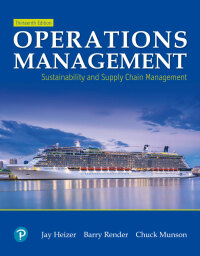1. How are cruise line sustainability programs similar to and different from those of hotels on shore?...
Question:
1. How are cruise line sustainability programs similar to and different from those of hotels on shore? Celebrity Cruises, with its reputation as a leader in the “premium cruise” industry, decided in 2013 to become an industry leader in environmental sustainability as well. Celebrity’s “Save The Waves” program was initially set up to increase compliance with the government’s “reduce, reuse, and recycle” policies. But Celebrity’s “Above and Beyond Compliance” (ABC) philosophy has committed the company to creating improvements over and above those imposed by law, often years ahead of federal mandatory requirements. Celebrity has an environmental officer aboard each ship.
How does Celebrity reach its sustainability targets? “We have learned over the years that what you measure gets better, so these goals are measurable, but ambitious,” says Senior V. P.
Patrik Dahlgren. “First, we aim to reduce waste whenever possible.
We work with our suppliers to reduce packaging materials and use more sustainable resources. Next, we reuse materials—
participating in container return programs and establishing a donation database for our fleet, just as we work with passengers to reduce the laundering of towels and bed linen. Last year we donated tens of thousands of mattresses, towels, and furniture items that would have otherwise gone to landfills. Finally, we recycle. All trash onboard our ships is hand-sorted by our crew members to determine what can be recycled.”
Celebrity’s ships are now able to repurpose 100% of their operational waste with a policy of zero discharge into the oceans. And with Celebrity’s goal of zero waste, its vendors are expected to supply food products and cleaning agents in reusable and returnable containers. Total waste recycled has increased every year since 2008, from 2 million pounds to over 30 million pounds recently.
By 2012, all of Celebrity’s ships had already installed advanced water purification (AWP) systems (which add 1–1.5% to a ship’s construction price). Their job is to treat “gray water” (the runoff produced by showers, laundry, pools, spas, and kitchens) and
“black water” (drainage from toilets and medical facilities). The AWP systems produce output cleaner than water from most cities and cleaner than that required by law.
Step by Step Answer:

Operations Management: Sustainability And Supply Chain Management
ISBN: 9780135225899,9780135202722
13th Edition
Authors: Jay Heizer; Barry Render; Chuck Munson






